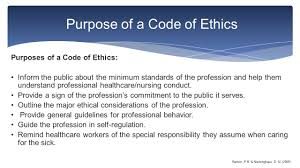Ethics in contemporary Healthcare. Codes of conduct for the healthcare professionals.

Ethics in contemporary Healthcare. Healthcare, like any other industry, operates under certain ethics. Ethics primarily pertains to the accepted relationship among the healthcare professionals, between the health care providers and the patients, and with the healthcare system in general. The following essay discusses the importance of ethics to the healthcare (McLean, 2016; Runciman, Merry, & Walton, 2017).
Ethics in contemporary Healthcare. Discuss critically why this topic (Ethics) is important in contemporary Healthcare.
To begin with, ethics promote a positive image of the facility providing healthcare services. Ethics in healthcare prescribe for respect of the healthcare providers to the patients, and uttermost integrity. Respect to patients involves etiquette to patients, and prompt response to their needs and required. Integrity is maintained through honesty to the patient, communication to the patients the true facts concerning their condition and the treatment they are undertaking (Freeman, 2013; Holmes, 2016). Honesty to the patient increases the level of their satisfaction and trust. Consequently, the clients develop a positive attitude towards the healthcare provider facility. The clients spread their satisfaction to other individuals and this eventually builds up the positive image of the facility in the healthcare industry market (Healy, 2016; McKean, 2016).
Ethics in contemporary Healthcare. Ethics promotes a harmonious working environment within the healthcare facility.
Ethics prescribe for respect between one healthcare employees to another within the healthcare facility. Employees should respect one another through refrain from abuse to an integer (Tarzian, Wocial, & ASBH Clinical Ethics Consultation Affairs Committee, 2015). Respect among employees and between the employees and the management foster teamwork. Additionally, the harmonious working environment in the healthcare facility facilitates professional communication (Fox, Bottrell, Berkowitz, Chanko, Foglia, and Pearlman. 2014).
Ethics maintains patient safety and protect patients from harm and injury.
Finally, ethics maintain patient safety and protect patients from harm and injury. As part of ethics, facilities require their healthcare professionals to adhere to the patient’s rights. For instance, as per the policies and goals of healthcare facilities, health facilities aim at respecting the patients’ right to informed consent. Patients are entitled to the type of treatment that they should undergo (Baker, Pearlman, Taylor, & Kipnis, 2016; Grady, & Danis, 2013).
In summary, ethics are as important as in the business industry. Ethics promote towards a positive image of the healthcare facility in the market. Additionally, ethics facilitate teamwork. Ethics safeguard the safety and protect patients from harm and injury. Order a custom essay now!
Ethics in contemporary Healthcare. References
Baker, R., Pearlman, R., Taylor, H., & Kipnis, K. (2016). Report and recommendations of the American Society for Bioethics and Humanities’ advisory committee on ethics standards.
Fox, E. with MM Bottrell, KA Berkowitz, BL Chanko, MB Foglia, and RA Pearlman. 2014. IntegratedEthics: An innovative program to improve ethics quality in health care. Innovation Journal, 15, 1-36.
Freeman, M. D. (Ed.). (2013). Law and bioethics (Vol. 11). Current Legal Issues.
Grady, C., & Danis, M. S. KL 2013. Does ethics education influence the moral action of practicing nurses and social workers, 4-11.
Healy, J. (2016). Improving health care safety and quality: reluctant regulators. Routledge.
Holmes, D. (2016). Critical interventions in the ethics of healthcare: Challenging the principle of autonomy in bioethics. Routledge.
McKean, S. (2016). Principles and practice of hospital medicine. J. J. Ross, D. D. Dressler, & D. Scheurer (Eds.). McGraw-Hill Medical Publishing Division.
McLean, S. A. (Ed.). (2016). First do no harm: Law, ethics and healthcare. Routledge.
Runciman, B., Merry, A., & Walton, M. (2017). Safety and ethics in healthcare: a guide to getting it right. CRC Press.
Tarzian, A. J., Wocial, L. D., & ASBH Clinical Ethics Consultation Affairs Committee. (2015). A code of ethics for health care ethics consultants: Journey to the present and implications for the field. The American Journal of Bioethics, 15(5), 38-51.

 +1 862 207 3288
+1 862 207 3288 